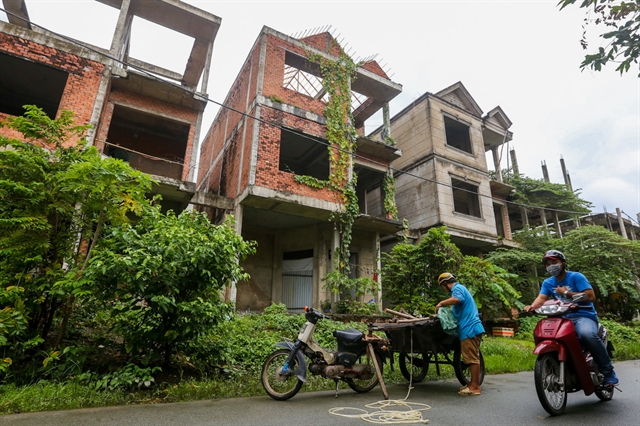 Economy
Economy


|
| Abandoned villas in HCM City. The southern city was proposing to tax second homes to prevent speculation. — File Photo |
HÀ NỘI — HCM City’s proposal of taxing second homes was stirring mixed opinions on its impact on the property market which was in liquidity problem as well as how and when the trial policy would be implemented.
The proposal was raised in the report of the municipal People’s Committee about the development of a resolution suggesting specific mechanisms and policies for the southern city.
HCM City authorities said that collecting taxes on second properties would help increase local budget revenue and prevent speculation. The policy would also discourage people from leaving property assets abandoned and prevent waste of social resources.
The proposal of taxing second homes drew market concerns as the real estate sector was falling in liquidity.
According to Trần Khánh Quang, general director of Việt An Hoà Real Estate Company, imposing a tax on second homes in this market condition could hardly achieve the goal of preventing speculation. In contrast, it might negatively impact the real estate market of the country’s largest economic hub, he stressed.
To prevent speculation, it was necessary to raise an appropriate tax rates and the policy should be applied nationwide, not in only one locality, he said.
Meanwhile, the real estate market was in a lot of difficulties. The supply source in HCM City was nearly at the lowest as many projects were stuck due to legal problems and the land fund was narrowing down.
If the tax was imposed in HCM City, the investment flow could move to other provinces, he said. Another problem which could arise was that buyers would have their family members to be named on the ownership certificate rather than theirs to avoid paying taxes and in that case, it could be even more difficult to manage.
He said that in order to tax second homes, it was important to digitalise the property market and transparentise all relevant factors such as land fund and prices to calculate the taxes and ensure transparency in how the tax collected was used.
Huỳnh Phước Nghĩa, Deputy Director of the Institute of Innovation under the University of Economics HCM City, the city must build the infrastructure system for the taxation which included the ownership database, asset valuation and basis for taxing such as classifying types of assets for different tax rates.
Bùi Quang Nghiêm from HCM City Bar Association, said the policy of taxing second homes would work to regulate the property market but should be applied simultaneously nationwide rather than only in HCM City.
Many countries in the world applied similar policies which helped ensure the property market developed stably and prevent the unreasonable inflation of housing prices.
In Việt Nam, housing and land prices were too high compared to incomes, making it difficult for low-income earners to afford a home.
Nghiêm said that if the policy was applied, localities would have more resources to invest in infrastructure development and provide supports to buyers of the first house to serve their accommodation demand and affordable home developers.
Disagreeing with this idea, Nguyễn Sơn Tùng from Legal United Law, said taxing second homes to lower housing prices and have resources to support first-home buyers sounded unreasonable.
He said that while the market was in decline, the imposition of the tax would worsen the situation rather than help prevent speculation. In addition, localities had not raised any details about how the tax would be imposed.
Another expert said that how to implement the tax imposition was an important issue to ensure fairness and feasibility.
Only taking the number of property assets one owned as the base for taxing would be unreasonable, he said. For example, one can own a property with high value but another own two of small value.
In another move, the Ministry of Finance was studying the adjustments of the taxes on property assets in the direction of increasing the rate on land and collecting tax on houses to encourage the efficient use of land and house, limit speculation and ensure reasonable budget revenue. This was a part of the action plan to implement the tax system reform strategy by 2030 which was approved recently.
Under the plan, the ministry planned to submit a draft law on property to the National Assembly for revision in 2023 and promulgation in 2024. — VNS




